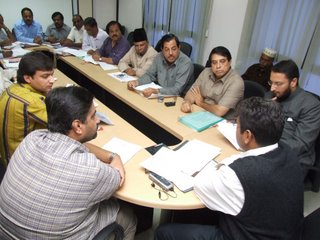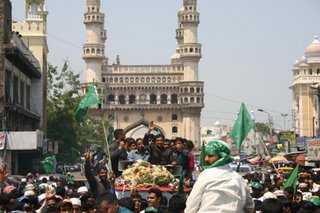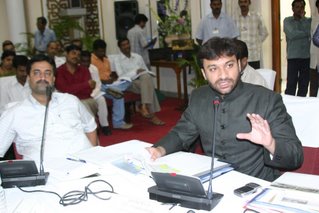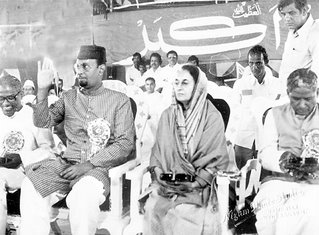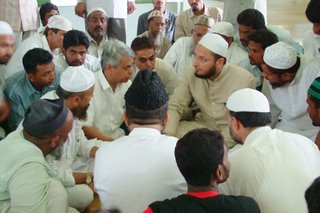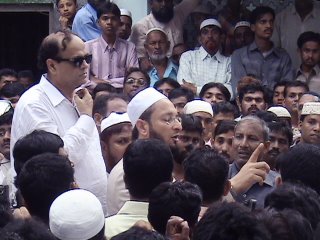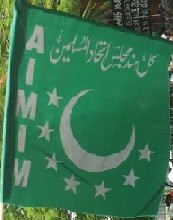 MiM Leader Akbaruddin Owaisi Addressing a MiM held Public Meeting In Hyderabad.
MiM Leader Akbaruddin Owaisi Addressing a MiM held Public Meeting In Hyderabad.
Akbaruddin Owaisi' MiM floor Leader in Assembly reprsentation on GO-610 To The Group of Ministers on Implementation of Six-Point Formula Government of Andhra Pradesh Hyderabad, A.P.
Dear Sirs , Subject: Memorandum from All India Majlis-e-Ittehaadul Muslimeenon the implementation of Girglani Commission Report—Regarding.With reference to the subject cited, the All India Majlis-e-Ittehaadul Muslimeen has decided to give this representation to the Group of Ministers on the implementation of Girglani Commission’s voluminous report on the gross violations of the Six-Point Formula, Presidential Order and the GO Ms 610 by the successive governments. At the outset, we express our serious concern over the gross injustice done to the hapless people of the backward Telangana region despite the assurances trotted out by the successive regimes to fully abide by the Six-Point Formula and Presidential Order on Public Employment. In fact, the successive governments have tended to aggravate the situation by actively pursuing policies and actions in clear violation of the provisions of the SPF and Presidential Order.Background:The chairman of the Group of Ministers—Shri M Satyanarayana Rao, Honourable Minister for Endowments—is well aware of the circumstances in which the SPF was announced and the Presidential Order was promulgated. The state had witnessed two violent agitations—firstly in Telangana region during 1969-71 and secondly in Coastal Andhra and Rayalaseema region in 1972-73—which claimed scores of innocent lives and led to untold repression on the people by the security forces.It may be recalled that Telangana Praja Samithi swept the Lok Sabha polls in Telangana in 1971 and Shri Satyanarayana Rao was among the 10 MPs elected on TPS banner out of the 14 in the region. The TPS contested the polls on the plank of separate Telangana state. Subsequently, Congress leaders in coastal Andhra and Rayalaseema, seeking separate Andhra state, spearheaded the Jai Andhra movement.During both these violent agitations, the AIMIM adopted a clear-cut stand against bifurcation of the state.
The AIMIM stood for an integrated Andhra Pradesh, much before the votaries of separate Telangana merged the Telangana Praja Samithi back into the Congress and the Jai Andhra protagonists had no qualms in rejoining the Congress. It was the AIMIM’s stand that was vindicated by the developments that followed both these separatist agitations.As you are aware, a political settlement was hammered out in the wake of these separatist agitations. The Six Point Formula was evolved by the AP leaders in consultation with the Central leaders and formally announced on 21-09-1973 with the avowed objective of removing the misgivings then prevailing about the future of the (integrated) state.The SPF, inter alia, provided for giving preference to local candidates to specified extent in the matter of direct recruitment to non-gazetted posts in certain categories, corresponding posts under the local bodies and the posts of tahsildars, junior engineers and civil assistant surgeons.
The same Point III of the SPF also provided for organizing the service cadres to the extent possible on appropriate local basis upto specified gazetted level to improve their promotion prospects.Furthermore, as per a clarificatory statement issued later, 80 percent of the Class-IV posts, 70 percent of the non-gazetted posts and 60 percent of the Gazetted posts are earmarked for local candidates. Necessary amendments were made to the Constitution by the Government of India through insertion of Article 371-D which, inter alia, authorized the President of India to make special provisions with respect to AP for equitable opportunities and facilities for the people belonging to different parts of the state in the matter of public employment and education.Consequent to the Constitutional Amendment, the Presidential Order -- AP Public Employment (Organisation of Local Cadres and Regulation of Direct Recruitment) Order-- was issued on 20-10-1975. It was incorporated by the Government of AP in General Administration (SPF) Department Go Ms No 674 dated 20-10-1975. To facilitate the implementation of the Presidential Order on public employment, detailed instructions were issued in GO P No.728 (GA, SPF-A Department) dated 1-11-1975. GO Ms No 741 was issued on 7-11-1975 to regulate promotions etc.However, a severe blow was dealt to the government employees, particularly from Telangana, during the tenure of the then Chief Minister Shri Jalagam Vengala Rao (who incidentally hailed from Khammam district in Telangana) when he ordered the compulsory retirement of as many as 11,000 employees, taking advantage of the national emergency imposed by the then Prime Minister Mrs Indira Gandhi in June 1975. It is also another matter that most of the employees forcibly retired at that time happened from among the minority communities.
On the other hand, while implementing the SPF, three development boards were created. Shri C Jagannatha Rao was made chairman of Telangana Development Board. Shri K B Narasappa headed Rayalaseema Development Board and Shri R Dasaratharami Reddy became the chairman of Andhra Development Board. Dr M Channa Reddy, who headed the TPS earlier, was appointed as Governor of Uttar Pradesh in October 1974. Former Chief Minister Shri Kasu Brahmananda Reddy was inducted at Home Minister at the Centre.Another severe blow was administered to the government employees when, soon after the Telugu Desam Party came to power following the 1983 Assembly elections, the then Chief Minister Shri N T Rama Rao reduced the retirement age from 58 years to 55 years. Almost 58,000 employees were affected by this draconian and ill-conceived decision. Most of the employees who were retired en masse consequent to reduction in retirement age were from Telangana region.Incidentally, it was during Shri N T Rama Rao’s tenure that government employees from Rayalaseema region voiced their grievances over injustice done to them in the implementation of SPF. After the issue was discussed in the State Assembly in Februry1984, the then government constituted an All-Party Committee in March 1984 to examine the grievances being voiced regarding lapses in the implementation of SPF in relation to public employment and inequitable employment opportunities in the three regions.The brief of the All-Party Committee was to suggest measures to ally misgivings and to recommend ameliorative and corrective steps to ensure equitable opportunities in the matter of public employment and implementation of SPF. A four-member Committee of Officials was appointed in May 1984 to go into the issue and it submitted its report.
Thereafter, in August 1984, the then government decided to appoint a full-time One-man Commission with Shri V Sundaresan, retired IAS official, to examine and recommend measures for rectification of lapses in the implementation of SPF.The Rayalaseema Employees Association represented to the Officers Committee that their region (Zone IV) was deprived of 50,664 posts in violation of the Presidential Order. Telangana NGOs Union represented to the government on 5-12-1985, alleging largescale arbitrary allotment of non-local employees to local cadres and claiming that 40,000 employees of other regions were posted to the local cadres in Telangana region in violation of Presidential Order in Zones V and VI (Telangana).Neither the Officers Committee nor Sundaresan Committee established the veracity of these figures but admitted that there were gross violations of the SPF and the Presidential Order. GO Ms No. 610 was issued on 30.12.1985, inter alia, stipulating that the employees allotted after 18.10.1975 to Zones V and VI in violation of zonalisation of local cadres under SPF be repatriated to their respective zones by 31.3.1986, by creating supernumerary posts wherever necessary. The GO also stipulated that the departments of secretariat should complete the review of appointments/promotions made under the Presidential Order by 30-6-1986.A glaring lacuna is that no separate mechanism at the government level has been mooted to monitor the implementation of GO Ms 610. For the multifarious posts in various departments, action was to be taken at various levels by the government. In some cases, representations by the individuals or by their unions had to be made to the competent authorities for redressal of their grievances.
Virtually, no action was taken for repatriation of the employees belonging to other zones allotted to zones V & VI.Current situation:Thus, this is not the first time that the violations of SPF and Presidential Order on Public Services have been noticed. Such violations have virtually been going on since 1975 itself. The situation has worsened over the last three decades, with successive governments, particularly those belonging to Telugu Desam (firstly under N T Rama Rao and thereafter under N Chandrababu Naidu) flouting SPF and Presidential Order with impunity.Such blatant violations of safeguards for Telangana people have only served to arouse regional passions in this volatile, backward region. The process was repeated during Chandrababu’s tenure. After Shri K Chandrasekhar Rao raked up the issue of non-implementation of GO Ms 610 and started Telangana Rashtra Samithi to fight for the cause of separate Telangana state, the then Telugu Desam regime had no option but to sit up and take notice.As you are aware, the then government convened an all-party meeting on the implementation of SPF in Zones V & VI pursuant to G O Ms No 610 on June 15, 2001. Subsequently, the government constituted the One Man Commission with Shri J M Girglani, retired bureaucrat, on June 25, 2001 to enquire into the implementation of GO Ms 610 and to suggest follow-up action for rectification of defects, anomalies and deviations.
The issue was raised as calling attention motion under rule 74 in the State Assembly on 29.12.2001 on the implementation of the SPF. The members were agitated over the non-implementation of the GO issued way back in 1985 and they pointed out that injustice was done to the locals in the matter or appointments due to non-implementation of the GO. On their demand, a House Committee was constituted to go into the issue of non-implementation of GO Ms 610 and suggest measures for repatriation of non-local employees to their respective regions (coastal Andhra and Rayalaseema).The House Committee, headed by the then Telugu Desam member R Prakash Reddy, in its interim report submitted on 17-3-2003, pointed out several violations of SPF in the matter of recruitments to the zonal posts in Excise, Police, Stamps and Registration, Education, Housing, Panchayat Raj, Irrigation and Industries Departments. In its second report, the House Committee recommended repatriation of 4,700 constables of the city police who were identified as “non-locals.”In fact, the second report was submitted days before the dissolution of the previous Assembly on November 14, 2003 and hence it could not be pursued. The House Committee unanimously recommended that the non-locals, who were appointed in the posts earmarked for the locals, against the SPF, should be repatriated to their respective zones with immediate effect. Prakash Reddy recently admitted that the legal adviser to the previous government had misled the House Committee on the violations.For more than two decades since 1983, there has been a general ban on recruitment to public services in the state, except in Education Department, Police Department and the Medical and Health Department.
The successive governments have only been recruiting teachers, police personnel and medical staff while filling up some vacancies in the other departments. Much of the recruitment in the Education, Police and Health Departments has been done in violation of the Presidential Order.Similarly, many vacancies at higher levels were filled up in various departments either through promotions or transfers, in utter violation of SPF.Moreover, due to en masse retirement of government employees consequent to the reduction in retirement age in 1983 and the annual attrition in staff strength on account of the retirement of employees on attaining age of superannuation, thousands of employees have retired in the last two decades. The vacancies at higher levels were filled through promotion and transfers but the vacant posts at the lower levels have remained unfilled. Thus, more violations of SPF and Presidential Order have taken place in the matter of recruitment, promotions and transfers in these years, thereby causing grave injustice to the local people of Telangana region.It is difficult to quantify the data on the number of non-locals recruited, promoted or transferred in violation of SPF and on the continuance of non-locals in local posts in violation of GO Ms 610 in Telangana region.
According to the Joint Action Committee of Unions of Telangana Employees, Teachers and Workers, Telangana people have lost about two lakh jobs on account of wilful violations and non-implementation of SPF, Presidential Order, Gentlemen’s Agreement and Mulki Rules by the successive governments in the last five decades since the formation of Andhra Pradesh on November 1, 1956.Girglani Commission Report:The Girglani Commission submitted its preliminary report on 6-10-2001 on implementation of GO Ms 610. The Commission submitted its final report on the deviations in the implementation of the Presidential Order and making suggestions on safeguards to set right injustices and anomalies. The Final Report, comprising 716 pages spread over three volumes, was handed to the government on September 30, 2004. The Assembly’s winter session was held in December 2004 but the state government chose not to table the report in the House at that time.Four-and-a-half months after the Final Report was received, the government laid it on the table of the Assembly on February 16, 2004. The brief, one-page action taken report merely mentioned that the government has constituted the seven-member Group of Ministers to examine the Report. The first meeting was held on 11-1-2005 and it was decided to communicate the Report to all the departments of secretariat for their examination and to furnish their suggestions/proposals pertaining to their departments.Normally, the ATR indicates the follow-up action taken by the government on the findings and recommendations of an Inquiry Commission appointed under the Commission of Inquiries Act.
In the instant case, the only follow-up action that the government has taken is the nomination of a group of ministers and dispatching the copies of the reports to the departments at the Secretariat level. This explains the callousness and casual approach of the Congress government, which promised in the poll manifesto on the eve of 2004 Assembly elections to implement the GO Ms 610 in letter and spirit.
Only the Home Minister Shri K Jana Reddy and the Home Department have evinced some interest in initiating action on the Girglani Commission’s findings and suggestions. The Home Minister announced recently that the government has decided to repatriate to their home districts as many as 3,150 police personnel who have been working in Hyderabad and Cyberabad commissionerates in violation of SPF and GO Ms 610.
The Home Minister, however, clarified that such repatriation would be done in phases to avoid administrative, departmental and legal problems. Moreover, no methodology or time-limit has been specified for repatriation of personnel to their respective zones. It is unfortunate that other ministers and departments have maintained stoic silence on the issue and not taken any action on the Girglani Commission report so far.Our party sees Girglani Commission report as “an eye-opener” on the gross injustice done to the people of Telangana region all these decades. Our party gives credence to the contention of TNGOs Union that as many as 60,000 non-locals from other regions are working in various departments in Telangana region in violation of SPF, Presidential Order and GO Ms 610. It is our considered view that the Presidential Order on reservations to local candidates has been grossly violated in Telangana and thousands of ‘settlers’ have grabbed the government jobs in Hyderabad, Rangareddy and other eight Telangana districts.
It is all the more painful to note that those who have been wilfully denying rightful employment to locals in Telangana in the name of an integrated AP have chosen to subvert the work of Girglani Commission in various ways. Not even one-third of the 134-odd departments furnished data to Girglani Commission. If all the departments had extended their full cooperation, the Commission would have brought to light startling facts on the injustice meted out to Telangana since the formation of Andhra Pradesh on November 1, 1956.Our views on specific findings of Girglani Commission:The Commission had received representations from associations and individuals with regard to injustices done in the enforcement of the Presidential Order and not merely in the implementation of GO Ms 610. The Commission gave its findings on each representation separately to the concerned departments with a request to take action and intimate the same to the Commission. Regrettably, the Commission did not receive any reports of compliance in any case from the departments concerned.We fully concur with the suggestions of the Commission that a regular nodal or monitoring agency like the General Administration (SPF) Department should be entrusted with the responsibility of follow-up action on the proceedings issued by the Commission on individual petitions.The government should act immediately on the suggestion of the Commission by addressing all the departments that the concerned authorities must comply with the findings of the Commission and report such compliance to General Administration (SPF) Department. This responsibility can be passed on to the special monitoring cell announced by the previous government in July 2003.The Special Cell was mooted to receive complaints/petitions on the violations of GO Ms 610 which provides for repatriation of non-local government employees working in Telangana region contrary to provisions of the SPF. To do its job effectively, the Cell needs to be empowered to redress genuine complaints about transgression of GO Ms 610. It must have the powers to rectify irregularities in respect of appointments, transfers and promotions. Our party endorses the recommendation of the House Committee on GO Ms 610 that all recruitments, transfers and promotions in the government departments should be cleared by the Special Cell.The Girglani Commission has pointed out numerous instances wherein the Presidential Order was ignored, skirted, bypassed or circumvented through wrong application or misapplication of some provisions. All the deviations, contraventions and violations noticed by the Commission in the course of its inquiries, hearings and meetings have been listed out in detail. The Commission has brought out as many as 150 different types of deviations or ‘maladies’ which have occurred over the years, covering the tenures of many regimes, mainly through seven sources.
Moreover, the Commission has given its findings and suggested appropriate remedial action for each specific deviation.We endorse the Commission’s recommendation that there should be immediate and effective action on the Commission’s proceedings on individual petitions. We also endorse the Commission’s suggestion that there should be immediate an effective action to put an end to the various deviations so that in the future, the Presidential Order would not be subverted either deliberately or through unpardonable ignorance. Also, strong deterrent action should be instituted against officials if there is any indication of gross lapse, mala fides, bias, favouritism or recalcitrant persistence in deviations on their part.The Commission noted that a very important cause for the violations of SPF and Presidential Order has been the absence of any mechanism for either ongoing control or monitoring system or inspections, lack of post-factor monitoring system and absence of a nodal agency to guide and control the implementation of the Presidential Order.
Absence of a legislative committee like Public Accounts Committee for monitoring the implementation of SPF also tended to create an attitude of indifference and callousness with a sense of immunity and impunity in the implementation of the Presidential Order over the last three decades.In particular, we are fully in agreement with the Girglani Commission on its recommendation pertaining to mechanism to ensure implementation and monitoring of Presidential Order (Chapter-14, page 183 of First Volume of Final Report). The Commission has suggested that the fundamental safeguard for the Presidential Order would be to categorically declare through a government order the sanctity and immutability of local character of a post or category of posts as on 18-10-1975 and the scope of the Presidential Order as originally promulgated on 18-10-1975.The Commission has spelt out the framework of safeguards and suggested immediate and impact measures as well as long-term measures. These have been elucidated in detail and the government will do well to follow these suggestions in letter and spirit. The Commission noted that no safeguards would work unless there is Big Brother watching.Therefore, we endorse the Commission’s recommendation that this vigilance role should be entrusted to a House Committee. At the political executive level, the Commission has suggested constitution of a permanent Cabinet Sub-Committee to oversee the implementation of the SPF. Instead of a special monitoring cell, the Commission has recommended the constitution of an Implementation and Monitoring Authority consisting of experts.In summary, the key suggestions of the Girglani Commission should be considered favourably by the State government and necessary follow-up action initiated without further loss of time so that justice is done to the people of Telangana and the gross violations of the Presidential Order and SPF are rectified at the earliest. Also, repatriation of non-locals unauthorisedly working in government posts in Telangana region should be taken up immediately.We demand that (a) a permanent accountability authority for the entire SPF should be established on the lines of Development Councils in the North-eastern Hill states; (b) a permanent accountability commission should be appointed for SPF like AP BC Commission, AP SC/ST Commission, AP Human Rights Commission, AP Official Language Commission and AP Minorities Commission; and (c) a Legislature Committee on the lines of existing Committee on Public Accounts, Committee on Estimates ac Committee on Government Assurances should be established to have an ongoing scrutiny regarding the strict implementation of the Presidential Order.The Commission has suggested that there should be a system of fixing responsibility and taking disciplinary action in the case of deviations from the Presidential Order.
The AP Regulation of Appointments to Public Services and Rationalisation of Staff Pattern and Pay Structure Act 1994 makes violation of this enactment by any officer a criminal offence punishable upto six months of imprisonment. This Act also stipulated penalty for the administrators who violate the Act.These stringent provisions were made in the Act because it involved vital economic aspects of the state. In the same way, the Girglani Commission has recommended a similar legislation on SPF since the Presidential Order involves vital political aspects of the state. The government should initiate action against the officials responsible for gross violations of Presidential Order on recruitments by suspending them and launching criminal proceedings against them.First and foremost, the government must take action to stop further deviations and to set aright the maladies, before resuming the normal process of recruitments and promotions. Our party demands the constitution of a separate Telangana Public Service Commission to fill up all the vacant posts in the region by selecting local candidates. Till the TPSC is set up, fresh appointments should be stopped.Our party also supports the other demands of the JAC of Unions of Telangana Employees, Teachers and Workers for 100 percent appointment of local candidates in the district posts, zonal posts and zonal gazetted posts and for earmarking 40 percent quota in the Secretariat as well as in 204 departments/state-level directorates/commissionerates for Telangana employees. Our party demands that GO Ms 610 should be implemented in all the departments—and not merely the Home Department—without further loss of time.We also demand the immediate revival of the Regional Development Boards for the three regions of the state which were abolished without rhyme or reason by the previous Telugu Desam Party government during the stewardship of the then Chief Minister N T Rama Rao in 1983. The earlier Congress government headed by Dr M Channa Reddy had promised to revive these Boards but nothing happened. The Chandrababu Naidu regime had to inclination to revive these Boards. But the Congress government must fulfil the popular demand for revival of these Boards immediately.While thanking the Cabinet Sub-Committee on GO Ms 610 for convening this All-Party meeting and affording us the opportunity to present our views on the Girglani Commission report, we earnestly hope that the Cabinet Sub-Committee will take our suggestions seriously and initiate necessary follow-up action. With regards,
Akbaruddin Owaisi
AIMIM Floor Leader
